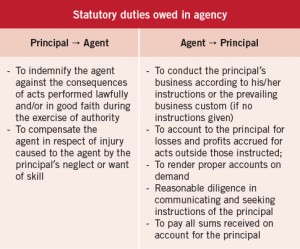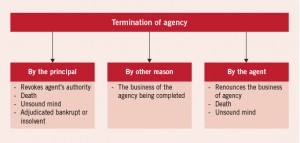An agent is a person appointed to do any act for another, or to represent another, in dealings with third parties. The person for whom such an act is done, or who is so represented, is called the principal. Any person who is competent to contract may appoint an agent. Section 145 of the Contracts Law of Cyprus expressly states that no consideration is necessary to create an agency. The authority may be express or implied. An authority is said to be express when it is given orally or in writing, and implied when it is inferred from the circumstances of the case. Oral/written representations or the ordinary course of dealing may be taken into account as circumstances of the case.

L. Papaphilippou & Co
律师
塞浦路斯
Advocate
L. Papaphilippou & Co
Cyprus
Duties owed
The duties owed between the parties to an agency relationship are depicted below. Section 148 encompasses the statutory extent of the agent’s authority to every lawful thing that is necessary to perform the act instructed on by the principal.
Where such an act is the carrying on of the principal’s business, every lawful thing necessary for the purpose or usually done in the course of conducting such business will be included.
In case of emergency, the agent’s authority will extend to all such acts for the purpose of protecting his or her principal from loss as would be done by a person of ordinary prudence under similar circumstances.
Pursuant to section 150, an agent cannot lawfully appoint another to perform an act which the agent has expressly or impliedly undertaken to perform personally, unless by the ordinary custom of trade a sub-agent may, or, from the nature of sub-agency must, be appointed.
As far as third parties are concerned, when a sub-agent is properly appointed and acts within the authority confines granted to him/her, he/she will bind and make the principal responsible for his/her acts as if he/she were an agent originally appointed by the principal. The agent remains responsible to the principal for the acts of the sub-agent.
Important consideration
Contracts entered into through an agent, as well as obligations arising from acts done by an agent, may be valid and enforceable as if the contracts had been entered into, and the acts done, by the principal. When an agent exceeds the authority conferred to him/her by the principal, the important consideration will be whether the authorised act can be extracted from the unauthorised act.
If the authorised act can be separated, then it will be binding between him/her and the principal. Where such separation is impossible, then the principal is not bound to recognise the transaction.
A principal may elect to ratify or renounce acts of the agent that have not been authorised and/or have been performed without his/her knowledge. Where such acts are ratified by the principal, whether expressly or by conduct, then they will be deemed as having been performed under the authority of the principal.
However no valid ratification can be made by the principal if the principal’s knowledge of the facts of the case is materially defective.
Termination of an agency
An agency may be terminated for any of the reasons illustrated below, the same being express or implied. The termination of an agent’s authority automatically terminates the authority of all sub-agents appointed by that agent.
Where the agency is terminated by revocation or renunciation, reasonable notice must be given as otherwise any damage resulting to the principal or the agent as the case may be must be made good.
Pursuant to section 168, the termination of the agent’s authority becomes effective: (a) to the agent, when it becomes known to the agent; or (b) to third parties, when it becomes known to them.
Section 181 expressly recognises the agent’s lien on the principal’s property. In particular, in the absence of any contract to the contrary, an agent is entitled to retain goods, papers and other property of the principal received by the agent until any amount due to the agent for commission, disbursements and services in respect of them has been settled to the agent by the principal.
17 Ifigenias street
2007 Strovolos, P.O. Box 28541
2080 Nicosia, Cyprus
电话 Tel:+357 22 27 10 00
传真 Fax:+357 22 27 11 11
电子邮件 E-mail:nt@papaphilippou.eu
www.papaphilippou.eu






















